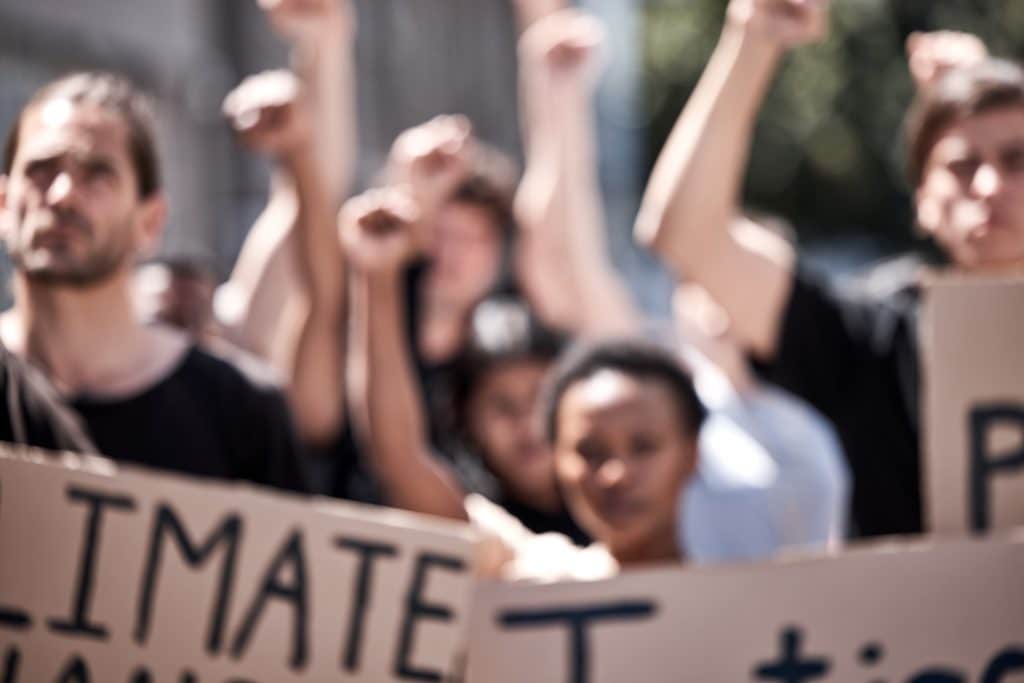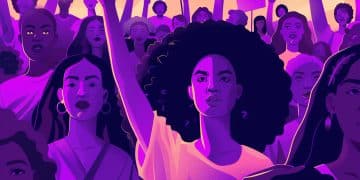Reproductive rights protests intensify: a global movement

Anúncios
Reproductive rights encompass the legal and moral rights related to making decisions about reproductive health, including access to contraception, the right to safe and legal abortion, and comprehensive sex education.
Reproductive rights protests intensify as activists worldwide demand change. These movements spark critical conversations about health and equality. But what’s driving this surge in activism?
Anúncios
what are reproductive rights?
Reproductive rights refer to the legal and moral rights related to reproductive health and decision-making. These rights involve the ability of individuals to make choices about their own bodies without interference. They encompass a broad range of issues such as access to contraception, the right to safe and legal abortion, and comprehensive sex education.
Understanding reproductive rights is crucial as they impact health, autonomy, and equality. The fight for these rights has historical roots, but their relevance continues to grow in today’s society.
Key Components of Reproductive Rights
- Access to contraception: Essential for preventing unintended pregnancies and managing reproductive health.
- Safe and legal abortion: A critical component for women’s health and autonomy concerning their bodies.
- Sex education: Comprehensive education helps individuals make informed choices and understand their reproductive rights.
- Protection against discrimination: Ensuring that all individuals, regardless of gender or background, have equal access to reproductive health services.
Advocates argue that reproductive rights are inherently tied to human rights. When individuals have the freedom to make decisions regarding their own bodies, they can pursue their goals without barriers. Health care providers also play a significant role by offering the necessary information and support.
Anúncios
The landscape of reproductive rights is continuously evolving, influenced by cultural, political, and social factors. Current debates often center on legislation regarding access to abortion and contraceptive methods. As discussions expand globally, understanding these rights becomes even more crucial.
significant historical protests
Throughout history, various protests have significantly shaped the landscape of reproductive rights. These movements have highlighted the demand for autonomy and access to healthcare. Understanding these protests provides insight into the ongoing struggle for these essential rights.
The causes of significant protests often vary, but the core message remains consistent: individuals deserve to have control over their bodies. Some notable examples include the 1970 Women’s Strike for Equality, which advocated for a woman’s right to choose.
Key Historical Protests
- Roe v. Wade (1973): This landmark Supreme Court decision led to widespread protests advocating for women’s right to safe and legal abortion.
- March for Women’s Lives (2004): Bringing together over a million participants in Washington, D.C., this event emphasized the importance of reproductive rights.
- Black Lives Matter Movement: The intersection of racial justice and reproductive rights has led to significant protests highlighting systemic inequalities.
- Recent Post-Roe Protests (2022): Following the overturning of Roe v. Wade, protests erupted across the country, reflecting the urgency and importance of protecting reproductive rights.
These protests have brought attention to the struggles faced by individuals seeking control over their reproductive health. Activists often highlight personal stories, proving that the fight for reproductive rights is deeply personal and political.
As we analyze significant historical protests, it’s evident that they are more than just events; they are movements that represent resilience and the collective demand for change. The legacy of these protests continues to inspire new generations of advocates.
key players in the movement

Key players in the reproductive rights movement play a vital role in advocating for change. These individuals and organizations work tirelessly to promote awareness and fight for the rights of all individuals regarding their reproductive health.
Many advocates are well-known figures, while others operate quietly behind the scenes. Their diverse backgrounds energize the movement and bring a range of perspectives to the table, helping to reach different audiences.
Influential Organizations
- Planned Parenthood: A leading provider of reproductive health care, offering services like contraception, cancer screenings, and abortion services.
- American Civil Liberties Union (ACLU): This organization defends individual rights and liberties, including fighting legal battles to protect reproductive rights.
- National Organization for Women (NOW): A grassroots organization dedicated to promoting equality for women, including reproductive freedoms.
- Women’s March: This grassroots movement advocates for various women’s rights issues, including reproductive rights, through events and campaigns.
Activists, healthcare providers, and politicians also contribute to shaping the conversation around reproductive rights. Their work often involves rallies, campaigns, and legal actions that draw public attention to issues affecting reproductive health.
In addition to organizations, community leaders play a critical role in representing local voices. They help tailor messages to resonate with their communities and ensure that all voices are heard in the dialogue surrounding reproductive rights.
The collaboration among such a wide array of individuals and organizations strengthens the movement, making it more effective in combating opposition and promoting reproductive rights.
impact of social media
The impact of social media on the reproductive rights movement has been profound. Platforms like Twitter, Facebook, and Instagram have become essential tools for activists. Through these channels, they share information, organize events, and raise awareness about crucial issues.
Social media allows for rapid dissemination of information, helping to mobilize support for various causes. People can engage with posts, share their experiences, and amplify voices that might otherwise go unheard. This visibility has led to significant changes in public perception and policy.
Benefits of Social Media in Activism
- Increased Awareness: Social media campaigns inform users about reproductive rights and relevant issues, reaching broad audiences quickly.
- Community Building: Online platforms allow activists to connect, creating a sense of community among individuals fighting for reproductive justice.
- Real-Time Updates: Activists can post updates during protests or legislative changes, ensuring that supporters stay informed.
- Fundraising Opportunities: Social media offers a space for crowdfunding efforts that support legal battles, educational programs, and outreach initiatives.
Moreover, social media enables the sharing of personal stories that highlight the real-world implications of reproductive rights issues. These narratives resonate with others, fostering empathy and understanding across diverse groups. As more people engage with this content, the movement’s reach continues to expand.
However, social media also faces challenges, such as misinformation. False narratives can easily spread, creating confusion around reproductive rights issues. Nevertheless, dedicated activists counteract these challenges by providing accurate information and resources.
The ongoing role of social media in advocacy is likely to grow. It empowers individuals to voice their rights and demands while adding momentum to the fight for reproductive rights.
future of reproductive rights
The future of reproductive rights is a critical topic as various social, legal, and political changes continue to shape this landscape. With ongoing debates, the progress and setbacks faced by advocates are important to understand.
As society evolves, new challenges and opportunities arise. The rise of technology, social media, and grassroots movements plays a significant role in shaping what lies ahead. Activists are using digital tools to spread awareness and mobilize support.
Potential Changes in Legislation
- State Legislation: Individual states may continue to introduce laws either expanding or limiting access to reproductive health services.
- Federal Protections: The necessity for comprehensive federal policies that protect reproductive rights at a national level remains crucial.
- Healthcare Access: Efforts to enhance access to healthcare, including reproductive services, will likely play a key role in future advocacy.
- Public Opinion: As awareness grows, shifts in public opinion may influence legislative changes and the overall approach to reproductive rights.
The intersectionality of issues related to reproductive rights cannot be overlooked. Factors such as race, gender identity, and socioeconomic status affect access to these rights. Future movements will likely incorporate a more inclusive approach to advocate for all individuals.
Moreover, the role of education in fostering understanding about reproductive health is undeniable. Comprehensive sex education and awareness campaigns may shape future generations’ views on these topics, potentially leading to a more informed and supportive society.
As the landscape of reproductive rights evolves, advocates must remain adaptable and proactive in addressing challenges. The continuous battle for equality and health autonomy is a journey, and the outcomes will depend on collective action and advocacy.
In conclusion, the movement for reproductive rights is both vital and ongoing. As society progresses, it becomes increasingly important to advocate for accessible healthcare and empower individuals to make informed choices. The journey toward equality in reproductive health involves understanding past challenges and utilizing new tools, such as social media, to promote awareness. With dedicated activism and community support, the future of reproductive rights can be shaped toward greater justice and accessibility for all.
FAQ – Frequently Asked Questions about Reproductive Rights
What are reproductive rights?
Reproductive rights refer to the legal rights and freedoms related to making decisions about reproduction, including access to contraception and the right to abortion.
Why are reproductive rights important?
They are important because they ensure individuals have control over their bodies and health, promoting gender equality and personal autonomy.
How has social media impacted reproductive rights advocacy?
Social media has amplified voices, spread awareness, and mobilized communities to support reproductive rights, making activism more accessible and engaging.
What challenges do reproductive rights advocates face?
Advocates face challenges such as misinformation, legislative opposition, and varying public opinions, which can hinder progress and access to reproductive healthcare.





